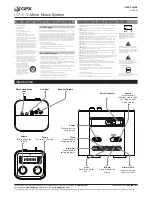
3
4.0
Taking Measurements
The following formula is used to calculate the pressure measured by the microphone from the output voltage
signal. The sensitivity of a microphone is typically measured at 250 Hz.
Pressure (Pa) = Voltage (mV) / Sensitivity (mV/Pa).
The lowest amplitude a healthy human ear can detect is 20 millionths of a Pascal (20
Pa). Another scale
more commonly used to describe sound pressure level is the decibel (dB). To convert the output voltage
signal (measured in Vrms) to sound pressure level (measured in decibels), use the following formula:
dB
P
S
V
SPL
ref
rms
Log
20
where
S
is the sensitivity of the microphone in mV/Pa, and
P
ref
is the reference pressure in air, which is 20
x 10
-6
Pa. The decibel scale is logarithmic and more closely matches the response reactions of the human
ear to the pressure fluctuations. Some examples of typical sound pressure levels are shown in the table
below.
dB
Pressure
Example
0
0.00002 Pa
Threshold of Hearing
60
0.02 Pa
Business Office
80
0.2 Pa
Shop Noise
94
1 Pa
Large Truck
100
2 Pa
Jackhammer
120
20 Pa
Airplane Take-Off
140
200 Pa
Threshold of Pain
At very high-pressure amplitudes, the microphone’s diaphragm will start to distort the measured sound
pressure. The maximum rated sound pressure level of a microphone is expressed as the amplitude at which
the Total Harmonic Distortion (THD) reaches a specified amount, typically 3% THD. It is important to note
that the highest sound pressure level that can be measured with a microphone system may be limited by
other parts of the system, such as the preamplifier, signal conditioner, or instrumentation. Conversely, the
Cartridge Thermal Noise (CTN) specification provides the lowest measurable sound pressure level that can
be detected above the electrical noise inherent within the microphone.
Temperature and pressure will affect the sensitivity of a microphone but these effects can be accounted for
by adjusting the recorded microphone values using the coefficients specified for each microphone model.
Simply calculate the difference in temperature and ambient pressure from those recorded during calibration
and multiply this value by the proper coefficient to determine the sensitivity offset. In most cases, the offset
will be very small and is therefore unnecessary.
5.0
Accessories & Miscellaneous
Transducer Electronics Data Sheet (TEDS)
Preamplifiers can incorporate TEDS devices, which have a built in read/write memory that contains relevant
information about the sensor and its use. Information includes manufacturer name, model number, serial
number, sensitivity, etc. The operation of TEDS devices is defined by IEEE P1451.4. A TEDS microphone
system includes a microphone mated with a preamplifier that contains the TEDS memory programmed with
both the microphone and preamplifier information. This is particularly helpful when using large channel
count systems and array set-up.
A-Weight Inline Filter
The inline filter is used in conjunction with an ICP
®
preamplifier to provide A-weighting for acoustical
measurements. The filter’s frequency response is weighted according to the A-weighting filter portion of
both ANSI S1.4 and IEC 60651 Type 1 Sound Level Meter Standards. ICP
®
signal conditioners of 4 mA
or greater are recommended when using inline filters.






























